 BOOKS
BOOKS « In Which We Count Down The 100 Greatest Science Fiction or Fantasy Novels of All Time »
 Monday, January 18, 2010 at 9:30AM
Monday, January 18, 2010 at 9:30AM  john harris The 100 Greatest SFF Novels of All Time
john harris The 100 Greatest SFF Novels of All Time
by ALEX CARNEVALE
What to read? It is a question asked mostly by women, who comprise the majority of America's reading public. Males make up some teensy other part. Either sex is challenged by a lack of a path through difficult material. It is difficult to know what is best. Although many have made a distinction between the fantasy and science fiction fields, I see no reason to arbitrary draw such a lien. The novels I find I most enjoy straddle the boundaries of the two, which is not to say that hard science fiction and pure fantasy don't retain their pleasures, and many books characterized at such found their way to this list.
At the nexus of the two genres is where the human imagination begins to reveal frightful and hopeful things about our own society. Sometimes I will come across someone reading what looks to me like a really boring book; e.g. anything by F. Scott Fitzgerald or James Patterson or Bill Bryson. Instead look to the vast store of cheap entertainment found in these immemorial classics of the page:

100. The Word For World Is Forest by Ursula K. LeGuin
An extraordinary powerful novel inspired by Vietnam in LeGuin's Hainish series, where one planet gives the gift of interstellar travel to the universe.
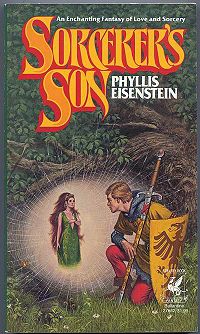
99. Sorcerer's Son by Phyllis Eisenstein
An original fantasy with the crucial grasp of how to make magic entertaining and plausible, not silly and random. Castles and sorcerers were never so deftly done.

98. Beggars in Spain by Nancy Kress
Kress is in true command in her short fiction, but this was her memorable attempt to capture how our society might change and still endure.
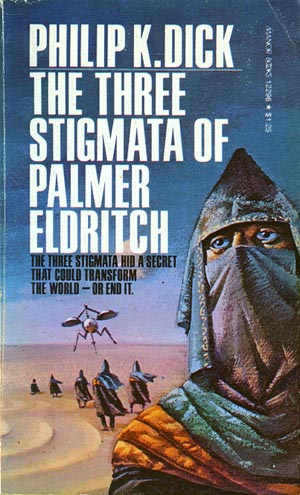
97. The Three Stigmata of Palmer Eldritch
One of his more well-thought out plots with interesting commentary on religion and sacrifice.

96. Snow Crash by Neal Stephenson
Incredibly entertaining and knowing about all sort of aspects of life, some of which I'd never even thought of before.
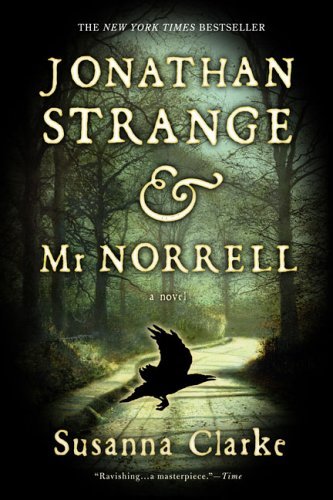
95. Jonathan Strange and Mr. Norrell by Susanna Clarke
An out-of-nowhere smash with rich detail.
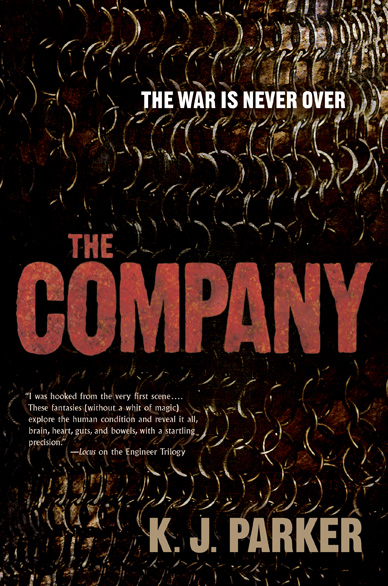
94. The Company by K.J. Parker
Parker's been one of the most exciting new writers to appear in the field. The Company is the best thing written about the meaning and import of war in two decades.
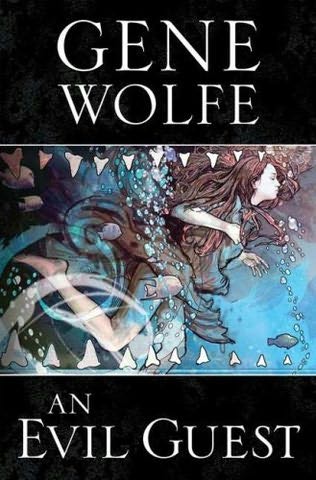
93. An Evil Guest by Gene Wolfe
Wolfe's inspired memoriam on Karl Rove, the Republican party, and the politics of the future. An insanely complex and deep science fiction story lurks below a Lovecraftian blend of Christianity and atheism. Easily the best book of 2008.
92. Jurassic Park by Michael Crichton
This list is also about pure readability — these books should flow easily into your subconscious, hopefully inhabiting your dreams. Park did more than that; it inspired an entire generation of fossile hunters, and it did it with a gripping adventure story that was also a pure morality play to the very last. Every time the story is told, we ask ourselves what to do with these beasts out of time? No answer forthcomes.
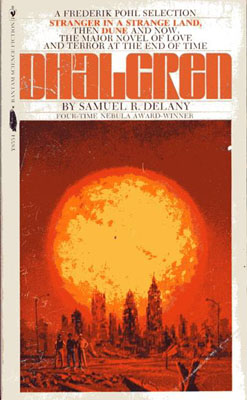
91. Dhalgren by Samuel Delany
An insane narrator with a lot of time.

90. Camp Concentration by Thomas Disch
Disch killed himself, a harsh end to one of SF's great cult heroes. Camp Concentration is a novel about prisons real and imagined, and its subtlety is convincingly rewarding in comparison to other novels that approach the same. Kafka-inspired, it reminds one of the master. What greater compliment is there?

89. Swordspoint by Ellen Kushner
Sly, understated, and poignantly delivered, Kushner wrote an incredible novel near the tail end of the 1980s. I never really cared for the sequel, but the original should be paired with the protagonist's origin story that she wrote last year and rereleased as one volume.
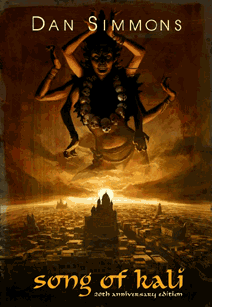
88. Song of Kali by Dan Simmons
As horror novels go, this one's relatively simple. Like Simmons' brilliant retelling of the death of Charles Dickens in Drood, this isn't all that it appears. Simmons is a preternaturally talented genius.
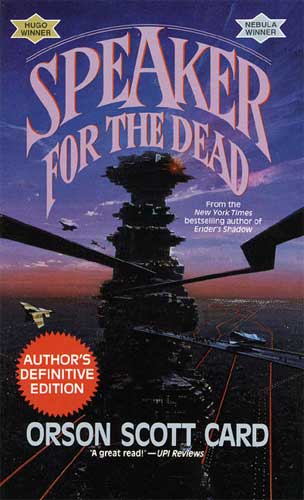
87. Speaker for the Dead by Orson Scott Card
Some call Speaker a sequel to Ender's Game, but the books are vastly different. Here is larger scope, greater torment. Xenocide followed, a worthy sequel before the series grew inevitably stale without a common element or quest. Card would remedy that inefficiency with the Alvin Maker books, his shot at creating an American fantasy.

86. A Canticle for Leibowitz by Walter Miller
The post-apocalyptic theme is so dumb and I never really liked it until I read Walter Miller's version.
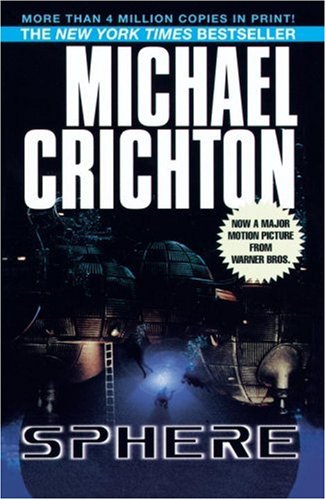
85. Sphere by Michael Crichton
The slightly better book, Sphere had a really strange Barry Levinson movie. It's basically a sub movie recast as a alien movie recast as a psychological fantasy. I have always found its claustrophobic environment enhancing. Crichton's remaking of adventure novels with science fiction was prescient.
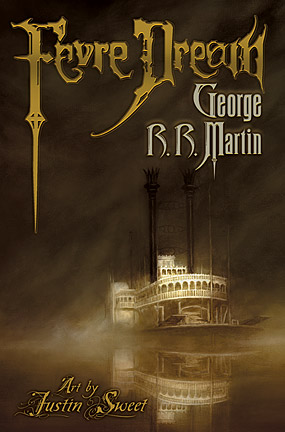
84. Fevre Dream by George R.R. Martin
The quintessential vampire story turned on its head. GRRM sets his vampire mythos in the legends of the American South, and essentially condemns slavery and blood-drinking as different but the same. A masterful treatment of the Dracula theme.
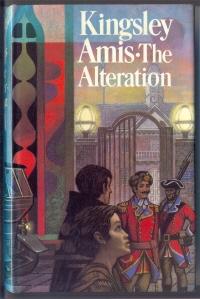
83. The Alteration by Kingsley Amis
Amis' disturbing vision of England without the Reformation.
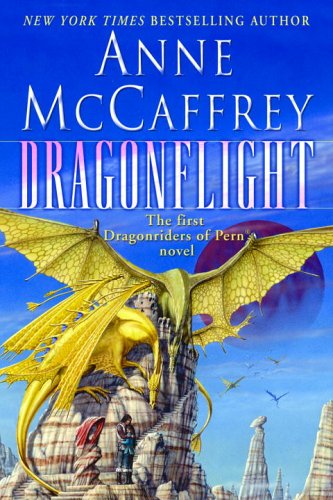
82. The Dragonriders of Pern by Anne McCaffrey
In this distinguished and wildly successful stint at world-building, McCaffrey built a fantasy of extreme and exciting possibilities that could capably consider almost any topic.
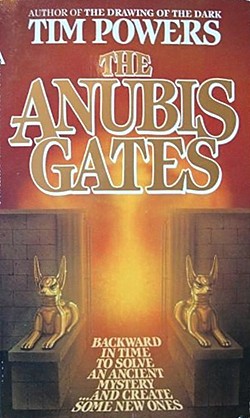
81. The Anubis Gates by Tim Powers
Time travel stories are uniformly bad except when they aren't.
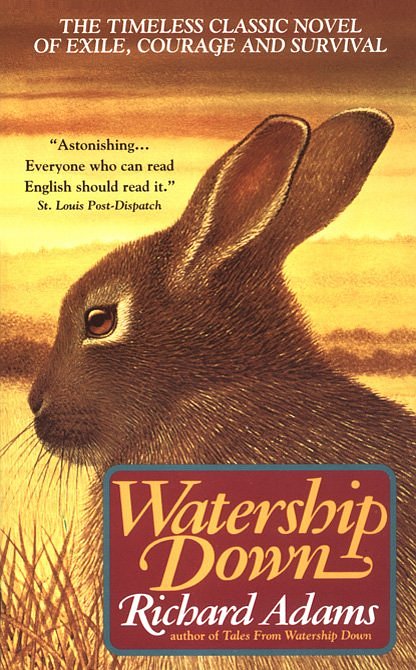
80. Watership Down by Richard Adams
An astonishing novel of anecdotal ecology, the best book ever written from the perspective of the animal.

79. Griffin's Egg by Michael Swanwick
If man evolves and no longer is man, what's left? Swanwick's virtues have been praised recently in these pages.

78. Altered Carbon by Richard K. Morgan
Supreme inheritor of the noir sensibility, Morgan's chilling novel sets a murder mystery in a near unrecognizable version of future Earth.

77. Free Live Free by Gene Wolfe
A waystation for indigents in modern-day Chicago, a time-travel story with balls and depth. Wolfe's haunting and miraculous horror novel is more unnerving that any Eli Roth movie.

76. Rendezvous with Rama by Arthur C. Clarke
Clarke was a decent scribe, but most of his work is a bit on the clumsy side. Not so with Rama, a scattered exploration of how space might fare put in close context with man.

75. Ringworld by Larry Niven
A wonderful out-of-the-box fantasy and introduction to Niven's Known Space universe.
74. Schismatrix by Bruce Sterling
A talented short story writer, Sterling created the perfect collection of this transcendant material with Schismatrix Plus.

73. Old Man's War by John Scalzi
The best science fiction can offer is some concrete re-imagining of what will actually become of us. In the world of Old Man's War, Scalzi consistently poses the bitter questions, and answers them with even tougher ones. By the time he's rehashing Heinlein's usual space colony plot in The Last Colony you feel more bowled over than ever.
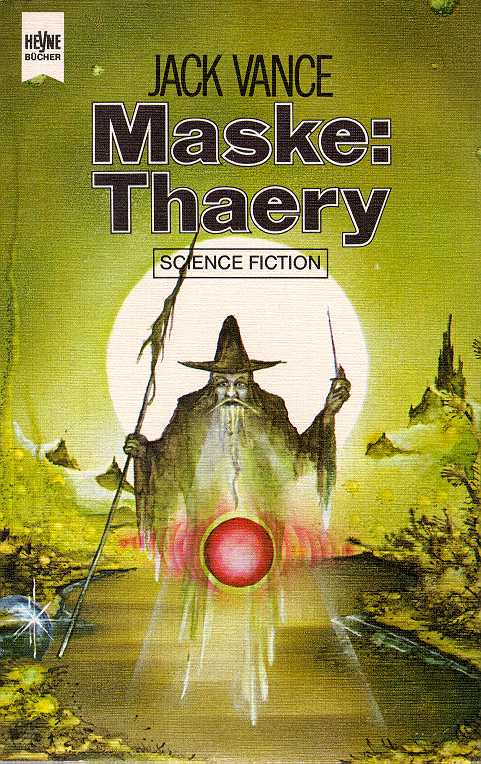
72. Maske: Thaery by Jack Vance
Vance's flawless bildungsroman takes up eminent domain in the context of a spy story and moving clash of cultures. A phenomenal example of how to write serious but simple fantasy.
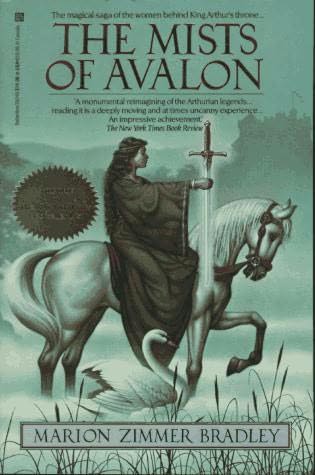
71. The Mists of Avalon by Marion Zimmer Bradley
First and foremost a telling of one of the most intriguing human myths in a very fun way.
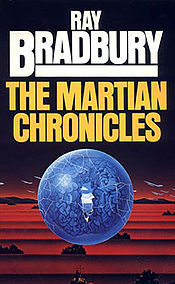
70. The Martian Chronicles by Ray Bradbury
Still feels very cinematic if not very edgy. Bradbury's future history is always fun to relive.
69. Flow My Tears The Policeman Said by Philip K. Dick
Almost everything written about future America is dwarfed by Dick's dystopia. It has now become a SF cliché, but Dick remakes it with thought and verve in this book and the 15th ranked book on this list.

68. The Gods Themselves by Isaac Asimov
Asimov was a determined technician and an inspired historian. This is a great example of his ability to take a familiar theme and completely flip it on its head.
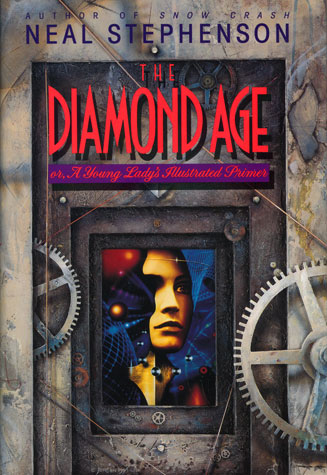
67. The Diamond Age by Neal Stephenson
It is something extraordinary to write with real feeling about places, people and ideas when most of them are invented. Stephenson's extraordinary perceptiveness is the key to this steampunk fantasy, and the plaudits of his readers are his true reward.
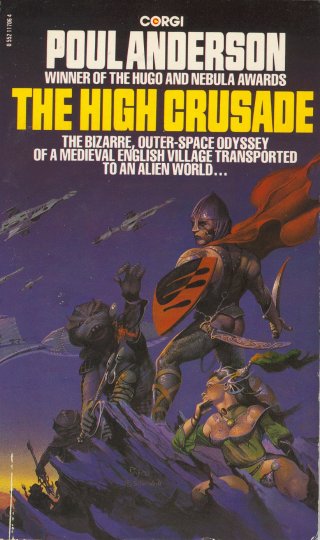
66. The High Crusade by Poul Anderson
We always imagine that human cultures that preceded us wouldn't fare well against starfaring conquerors. Anderson undermines this point of view by casting the early English amongst the stars. The English villager is a hearty sort, but Anderson's grasp of what makes alien cultures 'alien' is pitch-perfect. A hilarious book.
65. A Song for Lya by George R.R. Martin
A beautiful story about our common empathy for others, life as a kind of parasite.

64. At the Mountains of Madness by H.P. Lovecraft
How to come at Lovecraft but from an angle? Here was one of predictive sensibilities and great zest for the occult. At the Mountains is among his finest work, but there is so much else to recommend.
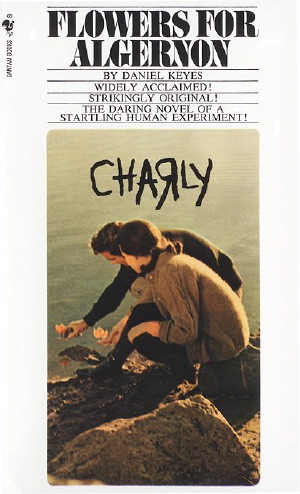
63. Flowers for Algernon by Daniel Keyes
When we imbue ourselves with recognition for nonhuman intelligences, we enrich the closeness between all peoples of difference. This message floats about in a terrific but sad novel.
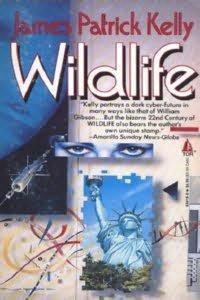
62. Wildlife by James Patrick Kelly
A pitch-perfect classic of the future. Imagine Requiem of a Dream crossed with Hunter S. Thompson's most fevered imaginings. A rewardingly sad story.

61. The Book of Knights by Yves Maynard
The most time-honored standard in fantasy fiction redefined for a new era. A most moral adventure.
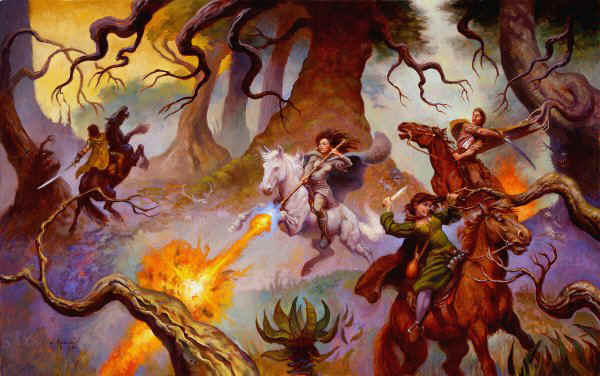
60. The Wheel of Time by Robert Jordan
No knock on Jordan. His series is long and impressive, and full of pleasant malefactions and strange echoes of America's military history. Its characters are numerous and sometimes difficult to track, but the rewards the story provides in the moments it strains to achieve make the journey worthwhile.
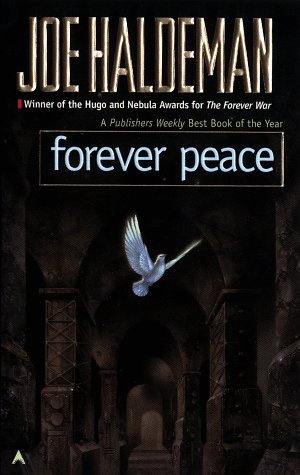
59. Forever Peace by Joe Haldeman
The advancement of technology will soon consume our experience of everything, especially how we act as a species. Haldeman describes this triusm and watches the inevitable new humanity emerge from the wreckage of an action story.

58. Nightwings by Robert Silverberg
A novel in three discrete parts, Silverberg's masterpiece of science fantasy imagines a dessicated Earth vividly.
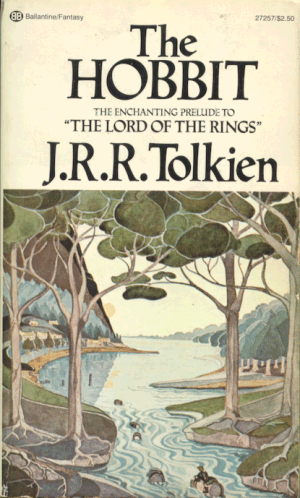
57. The Hobbit by J.R.R. Tolkien
A small little tale of sheer perfection, Bilbo was such a memorable and worthy person that it felt reassuring to get to know him in such a fashion. Therefore handing off his tale to Frodo seem a difficult and preposterous transition, until you figured out it was all about man's love for man.
56. Cat's Cradle by Kurt Vonnegut
The doomsday book, the one about death in every molecule of life. Vonnegut writes at his highest level here.

55. Gravity's Rainbow by Thomas Pynchon
This was his best effort at describing a philosophy in terms of a world.

54. The Book of the Short Sun by Gene Wolfe
Following right after his Book of the Long Sun, this effort takes us to dual planets of Blue and Green, where inhumani stalk people and machines, and Horn tries to unite his worlds.

53. The Forever War by Joe Haldeman
His reimagining of his experience in Vietnam as space conquest rendered bloody and mind-numbing. The novella inside, the tale of the soldier's return to a society he no longer recognizes, is a masterpiece in itself, but Haldeman is also interested in turning over in his mind the harshest parts of a military life.
52. Foundation by Isaac Asimov
He imagined civilizations across the stars and an Encyclopaedia Galactica.

51. The Wizard of Earthsea by Ursula K. LeGuin
A magical fantasy epic, LeGuin wrote slightly down to a younger reader, and she found a new and growing audience to appreciate her impeccable grasp of how individuals interpret and reacts to their civilizations.

50. The Wizard Knight by Gene Wolfe
Wolfe challenged himself by taking the most traditional theme and flipping it around so many times. As effortless as magic properly done.

49. The Fountainhead by Ayn Rand
Rand took as subject the plight of the individual in a society that attempted to squelch his purpose and initiative at every turn. Through the story of Howard Roark, we begin to appreciate and see for the first time the visible constraints on ourselves that were invisible before. Among the most widely read books ever written.
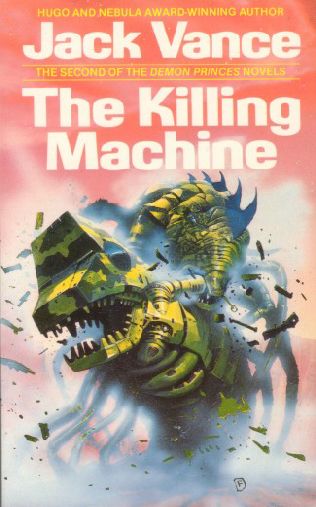
48. The Demon Princes by Jack Vance
The most entertaining discourse on the subject of revenge and justice short of Kill Bill. Relentless, interplanetary fun along the Gaean Reach with Kirth Gersen and the women he loves and doesn't love. So funny you're still laughing when you start crying, and probably vice versa. Ranks with Vance's finest cultural, social, and moral investigations.

47. Ender's Game by Orson Scott Card
The simplest and oldest of science fiction conceits: a boy is raised at war to save his people.

46. The Baroque Cycle by Neal Stephenson
A marvelous explanation of world history as pieces of a larger puzzle. Incredibly erudite and incidentally educational.
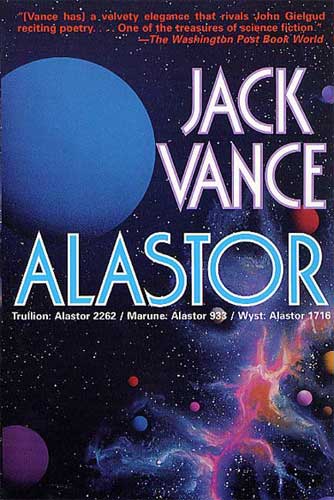
45. Alastor by Jack Vance
Three vast and inspiring novels on the theme of utopia. The first has an astonishing setting and Vance's favorite invented game: hussade. The second of the two is a comedy of manners to set you up for the last, Wyst, which is every bit as moving and disturbing as the best utopian fiction, and with a more satisfying result.
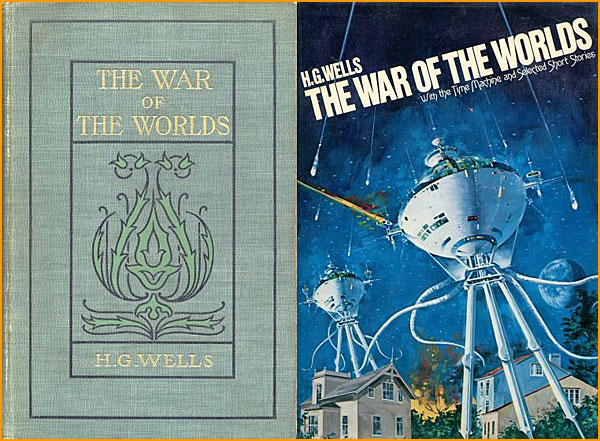
44. The War of the Worlds by H.G. Wells
Invasion is a classic human story, because of the likelihood that it will happen in our lifetime.

43. Flatland by Edwin Abbott
Math and science are close bedfellows, but it is hard to inscribe such arcane pleasures in the guise of fiction. Abbott solved that difficult riddle marvelously.

42. Farmer in the Sky by Robert Heinlein
His only novel to take place on Ganymede, Jupiter's Moon. It presents incredible understanding of every subject it approaches, first and foremost that of a child growing up into an adult.

41. A Scanner Darkly by Philip K. Dick
The drug culture never had a better advocate and enemy than Philip K. Dick. Great movie, too.
40. Animal Farm by George Orwell
Above all, a very funny book about the intransigence of people to live correctly.

39. The Hitchhiker's Guide to the Galaxy by Douglas Adams
An incomparable marvel of high and low humor, left and right galaxies. The sequels didn't have as much promise, but Adams always clued you in on the joke.
38. Slaughterhouse-Five by Kurt Vonnegut Jr.
His own novel about what men become in war. Very discursive for the time and full of knowing insights.
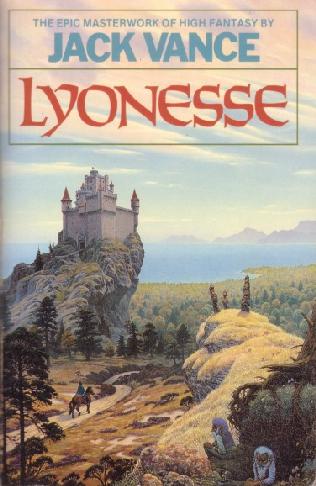
37. Lyonesse by Jack Vance
A hilarious and exciting fantasy set in the Elder Isles, which sank into the Atlantic Ocean. The series is enchanting beyond anything else in the genre. The middle of the first book provides a vicious shock unique to Vance's distinctive patterning of individuals.

36. Starship Troopers by Robert Heinlein
The first military adventure to grip us by our lapels and inform on exactly what war was, why it was waged, and how to go about waging it without losing your soul. As always, the enemy must be nameless and unthinking, until the enemy is no longer as threatening as the thought of continued war.

35. True Names by Vernor Vinge
Vinge's story basically described what would happen when diverse intelligence connected with each other on the internet. He was right about almost everything, and no one had really thought of this before, so the story has retained a certain flair even though Vinge was still improving as a writer of fiction.
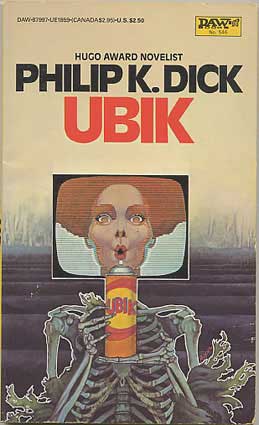
34. Ubik by Philip K. Dick
Time travel has gotten so stale that J.J. Abrams plans to use it on all of his TV shows. Dick shows J.J. how it's really done, with plenty of personalities and jawdropping moments in time and space. He never had quite this much fun again.

33. The Hyperion Cantos by Dan Simmons
Man's conquest of the stars is inevitable; Simmons detailed some of the potential complexities with such an arrangement. Hyperion is a wondrous and incantatory setting for some of the best words per entertainment science fiction has ever seen. A wild and amazing ride.
32. Citizen of the Galaxy by Robert Heinlein
Besides its many virtues as a narrative, it is among the finest pieces of anti-slavery prose written by a white man. Heinlein's concerns are many: the rise of poverty, the existence of nationalism and prejudice, the vagaries of wealth. He concentrates them all in this modest tale about a slave bought at an auction by a particularly free-thinking individual, and raised across the stars.

31. A Wrinkle in Time by Madeleine L'Engle
This was a book for children? I still remember the first confusing words of A Wrinkle in Time, proof that I was not alone in the universe. How they teach this book to young people is beyond me. Even now, mysteries arise and emerge out of each tesseract made real. A book still ahead of its time.
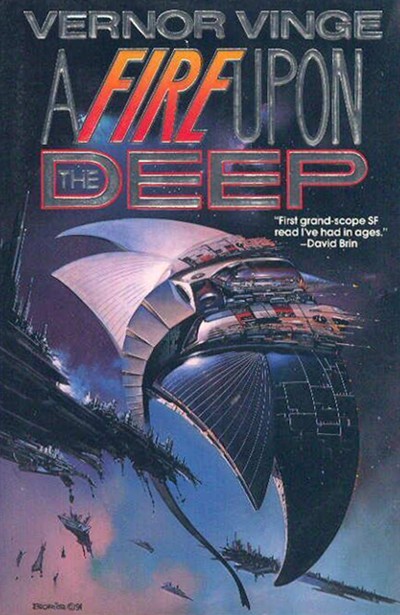
30. A Fire Upon The Deep by Vernor Vinge
Both an immensely moving epic and a hilarious commentary on the primitive stages of the Internet, Vinge created two amazing alien spieces and never lost track of the personal in a world where gods appear out of the Beyond.
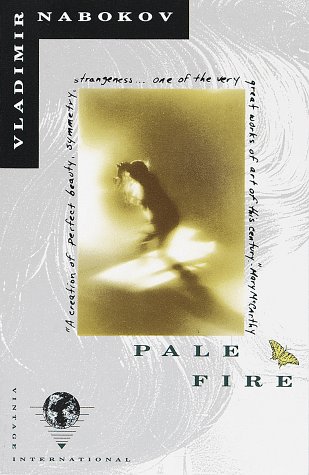
29. Pale Fire by Vladimir Nabokov
He was just never bad, and here he was at his immortal best with an examination of the interconnections between all that is and will be. A true classic with fantasy undertones. Like most masterpieces, its straddling of genre is part of the charm.
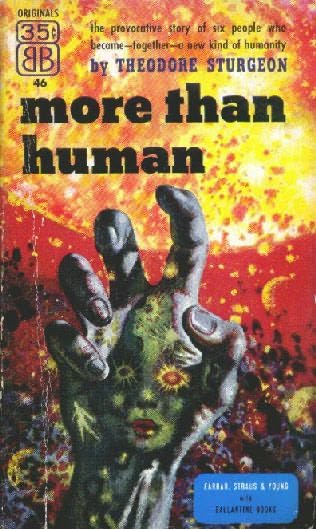
28. More Than Human by Theodore Sturgeon
What happens to homo sapiens after we die on the inevitable altar of natural selection?
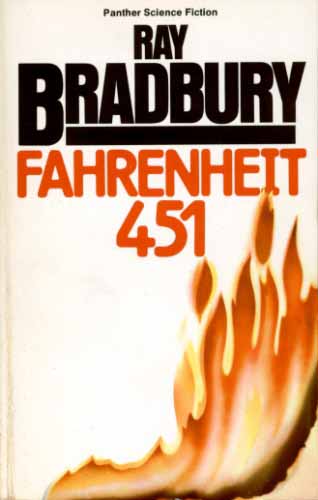
27. Fahrenheit 451 by Ray Bradbury
The idea that anyone who destroys knowledge is a sinister creature is directly related to this novel, and it has guided many estate lawyers.

26. 1984 by George Orwell
As a ripping good read, it's slow and methodical in parts. Its ideas are so clearly subsumed within our culture that it seems funny to think that really this was a utopian fantasy of serious horror. If this book didn't exist, we'd still be waiting for someone to write it.

25. I Am Legend by Richard Matheson
Matheson's version of the vampire apocalypse, it is a far deeper mix in print, and funny, too.
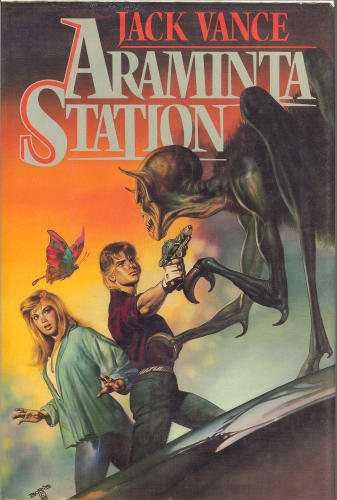
24. The Cadwal Chronicles by Jack Vance
Like much of Vance's work, its ostensible subject is the ownership of everything. Cadwell is a secluded planet as nature observatory where a class of elites dominates the undermen Yips. In three volumes it approaches titanic questions philosophical and strategic, and dispenses with them for the fun of revenge and the purity of moral action. Wayness Tamm is among fiction's great heroines.
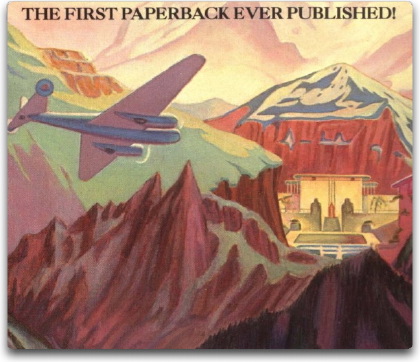 23. Lost Horizon by James Hilton
23. Lost Horizon by James Hilton
The gorgeous, austere fantasy classic that inspired a generation. Lost Horizon is about coming to terms with the limits of your own life.
22. Alice in Wonderland by Lewis Carroll
So much of what we think is unusual flows from this book.

21. The Wonderful Wizard of Oz by L. Frank Baum
Fantasy as a triumph granted to us upon crossing of worlds.
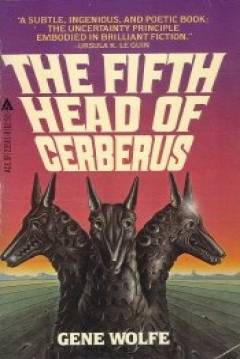
20. The Fifth Head of Cerebus by Gene Wolfe
The greatest novella ever written in any genre, this is Wolfe's tribute to Proust, and these two crazy planets are a lot more interesting than upper-caste France. Also one of the great mysteries written in English. Thank God for Gene Wolfe.
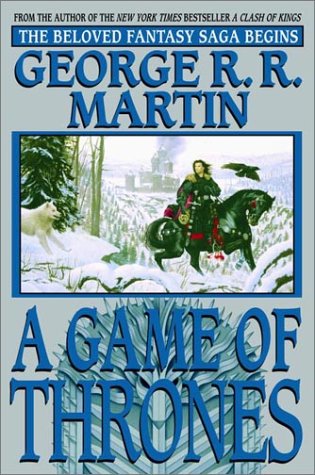
19. A Song of Ice And Fire by George R.R. Martin
With Martin 1100 pages into the fifth book, what better time to revisit a deep and complex epic than before its HBO premiere?
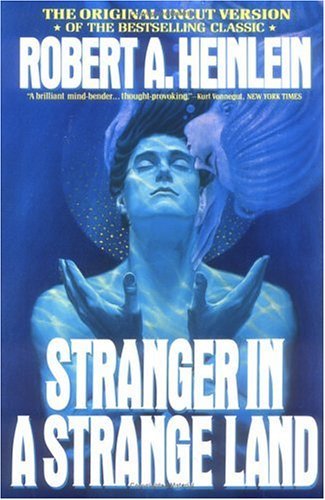
18. Stranger in a Strange Land by Robert Heinlein
The simplest science fiction story infused with the basic tenets of Heinlein's philosophy of free love. The best alien ever makes you want to taser E.T. until he stops his weird relationships with young boys.

17. The Fionavar Tapestry by Guy Gavriel Kay
Awe-inspiring scope that never falters or is intimidated by the wild fantasy. More real and telling about humanity than The Great Gatsby.
16. The Master and the Margarita by Mikhail Bulgakov
The finest non-Orwell repudation of communism packaged in a wild novel that rises above doctrine, creed, or power.

15. The Man in the High Castle by Philip K. Dick
His conceptually fascinating contradiction of Triumph of the Will. Only Dick could turn something so natural and simple into the darkest of mysteries.
14. All My Sins Remembered by Joe Haldeman
Most books have some things, but this book has everything. Haldeman's underappreciated masterpiece is begging to be a big budget film, but for now it's available whenever you want to leave this world, and go beyond it. The best presentation of mystery in the genre since Edgar Allen Poe.
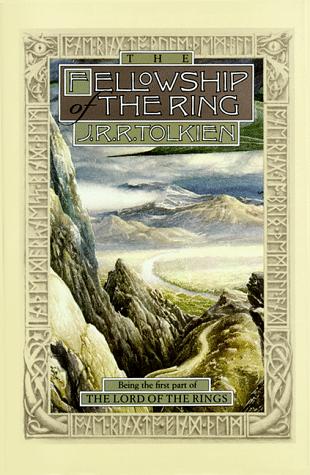
13. The Lord of the Rings by J.R.R. Tolkien
It has been the major influence of many horrible things, but also many wonderful things. Where it leans on frivolity and wishful thinking, it is forgiven. It's really hard to read these today with how far things have come, but an important effort at the time.
12. Planet of Adventure by Jack Vance
The greatest series of adventure novels ever written. Real thrills that come from Vance's immaculate ear, revolutionary style, and deftness with plot. The most fun you can have with books.

11. Dune by Frank Herbert
Why is this arcane tale of sand people such potent fodder? It is at once a brilliant retelling of the destruction of the Earth and a cipher for all our wants and deepest desires. Herbert's supreme achievement is a bit dated today, but still brilliantly structured and legendary.

10. A Clockwork Orange by Anthony Burgess
We've all seen the Kubrick movie, which captures this brand of madness better than most films. The subject of violence in our culture gets short shrift because artists opine against it constantly. Thus genre can encompass what traditional fiction cannot.

9. The Left Hand of Darkness by Ursula K. LeGuin
Her Hainish cycle is full of vastly different works, but the strange people of Winter are an unforgettable brew. LeGuin is the supreme master of how we belong to our cultures more than our institutions. Her descriptions of intercourse among the native peoples are among the most startling in all of history. Incredibly, she would go on to top this perfect novel.
8. The Book of the New Sun by Gene Wolfe
Jack Vance's Dying Earth was a comedy of errors; Severian's tale is a tragedy beyond measure. Wolfe basically rewrites Earth's languages and culture until they look unrecognizably familiar. Close to perfect as a series of four can get.

7. Brave New World by Aldous Huxley
The theme of utopia is never properly done for obvious reasons. Huxley built on other's shoulders to ask all the right questions. In doing so, he raised his subject matter above its usual weaknesses and infused it with a new point of view, the objective of any truly great piece of literature.

6. Frankenstein by Mary Shelley
She came first, and there was no better. Even today, Frankenstein is no more than a mere afternoon's reading, but it raises questions that never stop being summoned by the recesses of the modern mind. Maybe the only myth that truly matters.

5. Tigana by Guy Gavriel Kay
It is the hardened tale of revolution in a strange and sacred place. As far as contemporary fantasies go, it has to look up on no other. Awesome sorcery, staggering statesmanship, perfect action and characterization. A nearly perfect novel.
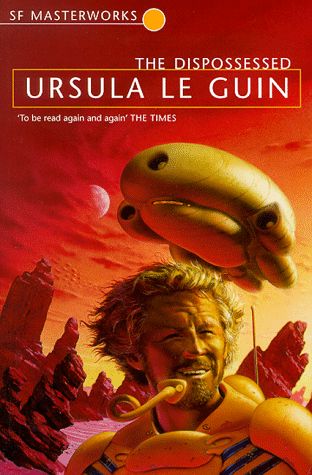
4. The Dispossessed by Ursula K. LeGuin
How do we live with each other without breaking our societies apart? LeGuin took the two sister planets concept to unbelievable heights. Shevek's tale is possibly the only one that matters, and I won't be shocked if it inspires a religion and saves us all at some point down the road.
3. The Dying Earth by Jack Vance
Vance picked up this world again in the early 1980s with the masterful Cugel's Saga and finished it off with Rhialto the Marvellous. Along with the original eponymous volume and quite easily the greatest fantasy sequence ever devised in The Eyes of the Overworld, these books provide everything of what we seek from literature: wry humour, great sorrow, masterful prose and dialogue, and intricately beautiful plotting.
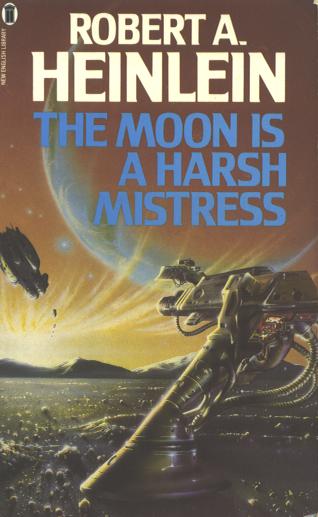
2. The Moon Is A Harsh Mistress by Robert Heinlein
Science fiction and fantasy have played roughly equal part in this list, but there is a fantasy element to Heinlein's ultimate masterpiece that rises above the rest. Heinlein imagines a world both breaktakingly real and manifestly impossible. He makes us care more deeply about unliving things that never existed than the people in our own lives. This is the import of fantasy. Then you have that the story of Mike and Wyoh and his friends builds on technology...geology...physics...politics...human rights. There is no subject that is not more enriched by this text's understanding of it.
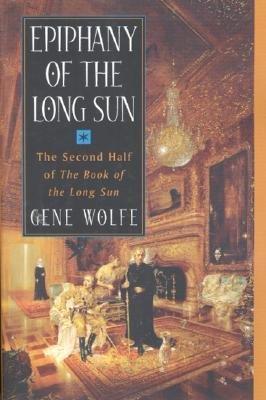
1. The Book of the Long Sun by Gene Wolfe
Gene Wolfe wrote these four novels in one incredible gasp. The series begins with the quiescent Nightside the Long Sun, where we are brought to Viron, the place of all our deepest hopes and desires. Like any great tale, it begins in the darkest poverty and ends in it. Three more books follow, each more entrancing and mystifying than the last. The Book of the Long Sun is really one novel, Wolfe's rewriting of the generation starship theme for modern readers. Wolfe is a Catholic — he converted when he married his wife — and his convictions are colorfully borne, yielding lessons for atheist and the most indoctrinated among us. Naturally, our protagonist is a man of considerable faith. Wolfe's imaginings are more real to me now than many actual events, managing to mercilessly strip ourselves of what we believe it is to be human until all that is left is our humanity.
Alex Carnevale is the editor of This Recording. He is a writer living in Manhattan, and he tumbls here.
It Is Best To Enjoy This Recording At Your Leisure































Reader Comments (299)
I feel Ender's Game should have been top 20...
No Risen Empire in Scott Westerfield
This list has no reputable credit to it
Lots of good and bad opinions so far. Which of course they all are just that...opinions. So with that in mind, I'll give mine :) .....Donaldson SUCKS. Made me want to scrape my eyeballs out and was as boring as Walden (sorry to all you transcendentalists out there). Only series I have not been able to trudge through and finish. So leaving him off is absolutely spot on. Tolkien so low?????? Wow. Not even sure where to go with that one. Lloyd Alexander's five book series on Pydain is another that I agree with that should have been included. "Post-apocolyptic themes are dumb"?????? Do what??? Sorry to burst this poster's bubble...but that IS fantasy. Whether or not a book's setting is pre-civilization, post-civilization, some other world or some un-named location that the author leaves to the readers imagination...fantasy is fantasy and it is what you make it. Case in point (which gets to my main reason for actually writing this) How can you leave out Terry Brooks? The Shannara series, INCLUDING the Word and Void has got to be one of the best of all time. And the way he has tied them together here towards the end is absolutely amazing!! I started them as a young teen and read all of the Shannara books first (post Sword of Shannara) and then picked up the Word and Void and now the Legends series which is tying them all together. If you haven't read this whole effort I HIGHLY recommend it. I don't want to ruin it for anyone that may not have read it and plan on doing so, so I will just recommend that you start with The First King of Shannara (a prequel that stands alone and is set before the Sword of Shannara series). Then go back to the Word and Void and then the Pre-Shannara and Legends.
Oh, and let's not forget about Brandon Sanderson.....
This is just what I've been looking for. I loved Hyperion and so was eager to track down new reading - I'll be making my way through this list for years. Thank you.
Childhood's End, City, Star Maker, A Case of Conscience, Past Master??? c'mon!
ok, ok... Zelazny. And these others are right. Stanislaw Lem could have used the push, man. I also get a distinct feeling that you have a problem with Margaret Atwood - The Handmaid's Tale belongs on this list a thousand times more than The Fountainhead (which doesn't belong on this list any way you look at it), more than Slaughterhouse Five, certainly, which should have ranked Vonnegut on that *other* list you did - The Firebombing of Dresden was not fantasy, or science fiction. It was the genocide of a city, and under-reported at that. I digress.
Also I personally think that The Lathe Of Heaven is a far better book than any of the Hainish stories. And I really like the Hainish stories. But thank you for putting The Word For World Is Forest in - I forgot all about that book. So I'm not all complaints, I guess.
I agree with Peter! I've read about 10 books on this list heh-hmm. So i just purchased Number 5 online and have a whole lot more to get excited about on my next trip to the library (I've never even read Vance, bloody hell! Or Lem, apparently). I'm not sure i will be as discerning in my critique as everyone else after i get through this list (and the responses).. but i will know some more names Damn it! (and places too :) Thank you for this list. Wahoo!
I think this would be a fairer list if you were only allowed to choose one book per author. Definitely Vance and Wolfe heavy with no Verne, Gibson or ADF. Not to mention Asimov's Foundation was voted by the SF Guild in 2000 as the best science fiction series ever and it's tucked away here in the back 50. Some things to add to my reading list, however
While I agree with much of the list I can not see how you can leave Terry Brooks off the list.
March Upcountry... great series
Ayn Rand you love or hate ... that's why books are great.
Enders game and Dune should be right up there on top (top 10?)
ENDERS SHADOW? Strange and Norrell not so much
Many of the rest are fantastic, many i have not read... thanks for the help everyone posting!
Sanderson is excellent!!!
Piers Anthony I grew up on and he has more than one series I would place up here.
Incarnations of immortality
There are a lot of younger age targeted books that are fantastic... They may be a quick read but are still worth the mention and a few are better than some on this list.
Again it is all taste, I think "The Road" Sucked and all my friends think I'm crazy.
Thanks people! for giving me a lot to read!!!!!!!!!!!!!!!!!!!!
In Which We Count Down The 100 Greatest Science Fiction or Fantasy Novels of All Time »
I'm not sure children stories count in such a list , firstly if you read them as a child then what you remember is only/barely the mood you felt that time and lastly if you read them as an adult then you are an editor and have no place voting lists of books.
Also horror stories are dubious on this list , noir for noir's sake is fetish not literature.
I found it amusing that whomever wrote this list says about Dune "is a bit dated today " like if the ongoing wars in Middle East weren't predicted by Dune 50 years ago .
Maybe if the corporation executives that produce weapons and extract oil would have read it and explained it to their political servants in Congress and other Parliaments we could have spared lots of lives from the flames of air jet fuel.
Very cool list, I haven't read most of these books so I'll have to get on it. I just finished reading Dune, and I'm likely going to start on George R.R. Martin's Game of Thorns series soon.
As others have said, I believe Ender's Game should be a little higher on the list. Similarly I think Asimov deserves more credit with Foundation.
And no Sirens of Titan by Kurt Vonneguet? I dont know what the public opinion is on that novel, but I found so much meaning in that book it quick became one of my favorites.
Making a list like this is of course going to kick up a world of subjective controversy, because the list itself is subjective, it cannot be in any capacity definitive. Even so it does a fair job of including many fine works. I like that it included George R. R. Martin, as that man kept me up more nights and caused more social and professional problems for me than any author in years.
If I could add some things subjectively, I would add:
Naomi Novak. Her characterization is near flawless. Her world is an interesting blend of the Napoleonic Era and Dragons. She sells gangbusters too.
R.A. Salvatore. His work and its influence on the fantasy world has been impossible to miss...unless maybe you walk through those few aisles at barnes and nobles with a blindfold. Oh, and you'd have to not play a video game in the fantasy genre practically ever. I've seen more spellings of the word "Drizst" for characters in MMOs than anything else. The Dark Elf trilogy are his finest works, everything else feels less than perfect in comparison. Strangely, Salvatore was able to introduce an alien world in perfect detail inside a world already clearly covered inside D & D subject matter. Covers of books are much better thanks to Salvatore's ascetics. No more gaudy 80's style fantasy. The controversial way in which he tackled action, likely inspired by his days as a bouncer, is no less notable.
J. Gregory Keyes should be on the list for Newton's Cannon. It's a highly interesting steam punk world filled with alchemy and technology.
How is Ayn Rand science fiction? She writes wish fullfillment fantasies for intellectual snobs.
Why isn't Neuromancer on this list? The definitive cyberpunk book. Howabout Phoenix without Ashes by Harlan Ellison and Geore Bryant: the novel that was everything The Starlost TV series was supposed to be. Asimov's Caves of Steel. I think Samuel R. Delany's Triton is a better choice than his unreadable incomprehensible, self indulgend Dhalgren.
Others that should have made the list:
Stephen King's Dark Tower (the first book only)
Watchmen (okay its a graphic novel but so what)
Just an interesting note about the cover shown for The Three Stigmata of Palmer Eldritch - my father had a copy of Dune with this cover art. Weird, but shows how the publishers recycled sci-fi art.
Personally, I think that Robert Silverberg's "Dying Inside" should totally be on this list. But, since this list is really "the 100 best sci-fi or fantasy novel THE WRITER has ever read", the reason why "Dying Inside" isn't on the list is simple: he's never read it. (My apologies, Alex, if you are actually a she. Please read the previous phrase accordingly in such a case.)
Hg
THE SIRENS OF TITAN (Kurt Vonnegut, Jr.)--the military life, an uncaring God for a new religion, a defeated interplanetary invasion, masterful manipulation of humanity
CONJURE WIFE (Fritz Leiber)--How does modern witchcraft work?
DRAGONSDAWN (Anne McCaffrey)--the prequel that explains...most of it, anyway
I'd definitely include the first two, possibly the third...
What about Hugh Cook? His are some of the few books I have reread several times... If I had to choose the author whose books gave me more pleasure, he would definitely be nº1 on the list. He is also one of the few to merge science fiction with fantasy.
Alaister Reynolds is also one of my recent favorites, with a more hard-core "scientific" approach.
"The Fountainhead"?
"Pale Fire"?
"The Master and Margarita"?
No "Blood Music" by Greg Bear? No "Out on Blue Six" by Ian McDonald?
Gene Wolfe might have the time to write his phonebook-length boring tomes but you need twice that just to get through them. Just like most "classics", no one reads 'em but everyone wants to say they did.
More than human is one of the worst sci-fi books of all time. It is better than "The king of elfland's daughter" and that's about it.
I agree that Donaldson probably deserved a mention. Who is this Gene Wolf guy? I read only one Vance book and didn't like it much.
I take it Jordon, Goodkind, Eddings, or Saberhagen are not quite on the same level as heinlein and similar... Possibly, but at least they come close. Eddings is a classic in the sword and sorcery genre, although you would have to say that all started with edgar rice burroughs.
I kind of wish Pratchett was on the list. His best might be Mort.
IMO if you are going to read Piers Anthony, prioritize Macroscope over Incarnations. Centaur Aisle was my favorite book at 12. I am afraid to re-read it.
Pandora beads
Pandora beads
Swarovski crystal
Pandora beads
Pandora charms
Pandora Charms
pandora charms
Pandora beads
Nice work keep it up and you are a good source of information
wish pearl pendant,
wish pearl sterling silver pendant,
wish pearl pendants & cages wholesale,
Thank you for the organized information. Everyone who happens to pass by your site will definitely get a lot from you.
wish pearls gift set,
18K GP wish pearl gift set,
wish pearl necklace,
Doris Lessing, Canopus in Argos series
Interesting stab at a Best SciFi FantasyList, but very tilted towards Vance and a number of other folks, whose works populate this list, with but little regard for many of the giants in this great field, or some amazingly talented young writers who are currently making their mark. I find the following authors either non-existant, or just getting lip-service or cursory treatment and that is a crying shame: Arthur C. Clarke (2001 Space Odyssey), Kurt Vonnegut (Player Piano and many more), Ray Bradbury (Illustrated Man, Dandelion Wine, and his venture into Horror/Fantasy with Something Wicked This Way Comes, which was made into a great movie with Jonathan Pryce as Mr. Dark and Jason Robards as Charles Halloway), Stanislaw Lem (Solaris), and C.S. Lewis (Chronicles of Narnia). Then, I would also include the following younger writers, who are wriiting great stuff for younger readers, but their work has been a hit with many adults, including Eion Colfer (for his Artemis Fowl series), and Jonathan Stroud (the Bartimaeous Trilogy). Sadly, Tolkien's Lord of the Rings is written off as something old and hardly relevant, which is sheer balderash, and Baum's Wizard of Oz series is hardly discussed. It should be noted that Baum wrote the first fourteen books of his wonderful, timeless series, and Ruth Plumly Thompson then wrote the next nineteen books in this series. The Oz series is a wonderful body of work that kids and adults, alike, enjoy to this day.
My favorite book series of all time is The Gunslinger series by Steven King. Wouldn't you call that science fiction/fantasy? Also, The Stand!!! Classic!!!
Thanks for some great ideas - I will look for some of these authors @ my library. I have only read a few of them before.
Greg Benford, Iain Banks, Richard Morgan, Alistair Reynolds, Alfred Bester, Roger Zelazny, Greg Bear, David Brin all appear be missing. It is a great starting list though. Lots of memories though.Jack Williamson! 40 years later, still giving me the shivers!
OMG I forgot John Varley's Steel Beach! And his Titan Trilogy
Cannot top Elizabeth Moon's The Deed of Paksenarrion for sheer heroic fantasy. I read it at a time when I desperately needed this female archetype.
I'm not really a fan of science fiction but I enjoyed watching the Jurassic Park movie. I guess I'll have to give credit to the Lord of the Rings for being so popular back then though I didn't even know that it's a science fiction. One of my favorite science fiction would be Lord of the Rings then Frankenstein.
cmon. whats with enders game being so low?
Perhaps I am much older than the average poster here? Or much younger? My first science-fiction novel was Have Space Suit, Will Travel, which I read in 1968. By the end of 6th grade (1969) I had read maybe 20 science fiction and fantasy novels, including titles such as Stranger in a Strange Land, Star Man's Son, Conan, and The Magical Land of Noom. So my tastes may differ.
From my reference point 42 years later, most of the works listed here are laughably amatuerish... displaying all the faults that cause most serious readers to categorize science fiction right down there with romance novels. Or silver age DC comics.
I do understand that science fiction does not have to be character driven to be entertaining. But when it IS character driven - when it has all the merits of great non-genre fiction then adds the "twist" of imaginary worlds - that is the ultimate seduction. Heinlein. Herbert, Brin, Card, Wolfe, Tolkein, Burgess, Huxley, Orwell, are all mature sophisticated writers who acheive that; Great writing plus the twist.
A Wrinkle in Time is a children's book, with all the sophistication that implies. (Yes, I know and appreciate that it is Christian. It is still simplistic and childish.). Fountainhead is neither science-fiction nor fantasy and does not belong on the list. Plus it ends with a 50 page rant. Frankenstein, Flatland, and War of the Worlds are seminal, but their dialogue and plot are stitched together worse than the Dr's creature. No one reads them except out of historical curiosity - the moral equivalent of playing Pac Man or Asteroids.
Delany, Dick, Vance, Lem, Silverberg, Anderson, Sturgeon, Vinge, Niven, Clarke, Haldeman etc are all old school guys and deserve enormous respect for carrying the genre. But lets not tell ourselves they were great artists. Theirs is the "twist" without the great writing, and their books gather dust for a reason. Our praise might get their books sold, but unless you are hard-core about science-fiction it will be "read five pages and threw it away."
The whole swords-and-sorcery genre is a personal favorite of mine (Conan, Gor, etc.) but that would not cause me to promote the books as anything special. Books like Sorceror's Son, Swordpoint, Dragonflight, Mists of Avalon, and The Book of Knights are pure genre trash. Below the first six Gor novels that regard IMNSHO.
AND I nonetheless laud your effort. I cannot create a "top 100" list of science-fiction and fantasy, because there are not 100 books that I respect enough to recommend. I love them for myself, but it is like a a drug habit... not something you advise others to take up. I have trouble listing twenty.
P.S. The wide representation of the best Science-fiction writer of all time is laudable, but the choice of Farmer in the Sky tells me you have not read even half of Heinlein's considerable catalog; Try Glory Road, Farnham's Freehold, Podkayne of Mars, The Star Beast, Waldo, and Magic Incorporated, The Puppet Masters, Tunnel in the Sky, Double Star, Orphans of the Sky... even Have Space Suit, Will Travel.
Well yes, thanks for the list, i didn´t know a few books listed here, and i will try them.
But as many posters mentioned before, a top 100 list without stanislaw lem is like a top 100 italian food list without pasta.....
Where are the Star Wars Novels? What about the Thrawn Trilogy
Come on;
No China Mieville, no Mcleod, no Banks, no Hamilton, no Gwyneth Jones- you have completely ignored modern British sci-fi, which to be honest leaves American stuff for dead.
No James Tiptree Jnr
No James Blish!! I would nominate 'A Case of Conscience' as still the best sci-fi novel ever written.
No Brunner, s.f.a. Delaney
No Donaldson!!!
No 'Year of the Angry Rabbit'?
No 'Aztec Century'?
No 'Day of the Triffid' - My God man, what were you thinking when you compiled this list.
And that is just with 5 minutes of outrage. Must do better my lad. Have you actually spent much serious time reading this genre?
I have to see this is a pretty good list from one Science Fiction fan to another. I just have a few criticisms well books I would add and maybe take away. First of all Vance is one of the most underappreciated authors in history. His settings, and description and charachters are some of the best ever. But I despise Michael Crichton. Do you dislike Bester. I uderstand if you do well not really. But the man invented cyberpunk before anyone knew what the 30 years before anyone knew what hell it was and he did when the first Hugo for the Demolished Man. Which I know its older but I think its a great novel a classic and its important in paving the way for Stephenson, Sterling, Gibson(who I know you hate) and so many others. And of course Stars my Destination. I just thought a little respect and room could be made for these classics. Also I would Of like to see a few more Delany like Nova, Babel-17(MAYBE THAT IN TOP 200) and Tritin. I also hate Robert Jordan I'm sorry. I do agree that Lem is Lame. Id of taken those books off maybe shuffled some things around a bit. But as a whole I think its a good list. As they say we can disagree without being disagreeable. Oh and Altered Carbon, and Schitsmatix are like taking drugs without the side effects they are fantastic reads, as well as Wildlife. Anyway nice job just give Bester his due thats it. I knoe you like the new stuff but comeon. And Frankentein is too high should be in the 60s. Anyway good job let me know what you think of Bester.
Also the only Arthur C. Clarke I can read without falling asleep is Childhood's End. Some people here I dont think no SCI Fi Fantasy at all while others do.I think its a good list with justfew ordering problems and a few books that would not of made mine. Mists of Avalon, well I guess Im not that crazy about Anne McAferty, Flowers for Algernon, ehh Frankentein, However, anyone who thinks Vance is not a great writer is a retard. You have some novels in here that are really quite excellent, Wild Life, Altered Carbon, Tales of the Dying Earth, Lyonese, Schismatrix, More than Human, A fire Upon the Deep, Master and the Margarita, Pale Fire and so many others. Id say about 85 novels should be on here and 15 should not, but are more like top 250. I still have to say Bester should be on here. I just want to know if you like him. A few more Delaney's and Lord of light by Zelansky. I dont like Brin that much either whats the facination I hate my main charachters to be a Dolphin and a chimp I wonder when they thro feces at each other. Bear and Egan have some interesting ideas but there prose is not good enoug to make the cut. Charachter drives plot as they say. I have to feel for the charachters to really enjoy a book. So I say to you sir or mam you did a good job don't listen to some of these people. You cant please everyone.
A laudable but impossible task! The terms "one hundred" and "best science fiction" are incompatible. Perhaps "one thousand" and "best science fiction", but I have doubts, even at "one million".
In the same spirit though, if we could list, in order, every work of science fiction we've ever read and compile an accessible database of sufficient depth, we might discover lots of interesting stuff about our individual and collective selves.
Thank you, Alex, for the courage to ask the hard questions.
Interesting list & I have read many of the boooks on it however, there are several great works missing from this list, namely, Octavia Butler (RIP) This list is incomplete without her.
Glad to see someone is giving Wolfe the credit he deserves!
No elric? alien?
Hello,
I think you misunderstand both Huxley and Orwell.
George Orwell's real name was Eric Blair. He was a british MI5 agent in India and other places in the 1940's. He wrote 1984 as a document of what he was a part of working in India. The book is reality based.
Huxley was a promoter of eugenics. Brave New World is a blue print for social engineering and social darwinism. Huxley was a real piece of shit.
I didnt see any sci-fi writers of color on here.....how can you have ayn rand and not jules verne? thats strange to me...so many are not included on this list but I guess with only 100 slots that was bound to happen...on Sunday 8-14-2011 I'll be reading an eexcerpt from my sci-fi novel, The Elements @ 8pm EST all are welcome conf# is 218-936-4141 & the password is 2655793
I have written an epic fantasy novel that emulates many of the greats on this list but attempts to spin the genre a bit and balance the storytelling from both sides of the good/evil coin. If you are interested in a good summer read please give it a try. Search "The Seraphinium" on amazon or follow this link:
http://www.amazon.com/Merchant-Menace-Seraphinium-ebook/dp/B0050I4PC6/ref=sr_1_1?ie=UTF8&m=AG56TWVU5XWC2&s=books&qid=1307498893&sr=8-1
Cheers!
i love that you have master and margarita so high on the list. i love bulgakov. Have you read any of the Darkover series by Marion Zimmer Bradley? I thought many of those books were great as was the series overall.
How you can have a list and not have John Brunner on it is impossible to believe for that mater stanislav Lem - I've tried to read Gene Wolfe and found him impossible to read but you have 5? of his books listed. Italo Calvino lshould be one there just for cosmi comexs.
I' m amazed.
Why doesn't anything by Walter Tevis ever appear on such lists? Mockingbird is a better novel than a large majority that are listed.